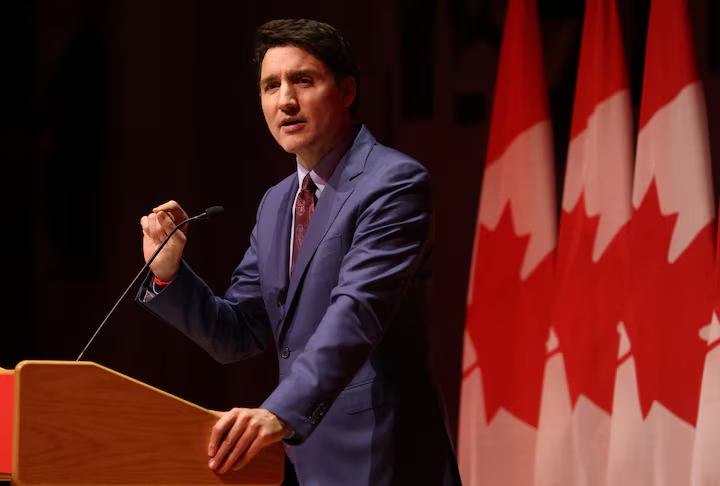According to a source acquainted with his thoughts, 53-year-old Canadian Prime Minister Justin Trudeau is anticipated to announce his resignation as leader of the Liberal Party after nine years in government. Although no final decision has been made, the announcement might be made as early as Monday. If verified, this action would represent a major shift in Canadian politics and the possible end of a chapter for the Liberal Party under his leadership.
Political Context of the Trudeau Resignation
As political pressure mounts, Trudeau’s resignation is becoming more likely. Ahead of the next federal election, the Liberals are in a precarious situation as recent polls indicate that they are well behind the Conservatives. By October 2024, a federal election must be called, and Trudeau’s leadership is coming under more and more criticism as the Liberals are losing ground in the polls.
The Liberal Party has called an emergency caucus meeting for Wednesday in reaction to these growing difficulties, with the focus of the discussions likely to be on the leadership’s future and whether a transition is required. As the party faces a difficult road, a number of Liberal lawmakers have expressed their displeasure with Trudeau’s ongoing leadership and called for a change.
- Liberals trailing badly in polls against Conservatives
- Federal election must be held by October 2024
- Emergency Liberal caucus meeting scheduled for Wednesday
- Growing pressure from Liberal parliamentarians for leadership change
Recent Developments Leading to the Trudeau Resignation
A slew of recent conflicts within the Liberal Party preceded the possible resignation. After attempting to demote Finance Minister Chrystia Freeland in December 2024, Trudeau was criticized by the people for his leadership style and she resigned. Freeland said that Trudeau’s emphasis on “political gimmicks” instead of putting the interests of the country first exacerbated party dissatisfaction and further damaged Trudeau’s reputation as a leader.
Trudeau has probably re-examined his stance more quickly as a result of the circumstances surrounding Freeland’s resignation and the pressure from declining approval ratings. Trudeau is under more stress as a result of the political impact from these conflicts, which casts question on his capacity to guide the party successfully into the upcoming election.
- December 2024 tensions over demotion of Finance Minister Chrystia Freeland
- Freeland accused Trudeau of prioritizing “political gimmicks”
- Declining approval ratings and public criticism of Trudeau’s leadership
Leadership Transition Amid Uncertainty of Trudeau’s Resignation
There are talks going on about who would lead the Liberal Party in the event that Trudeau resigns as the pressure on him increases. Dominic LeBlanc, the finance minister, is reportedly being examined as a possible interim leader. The timing of the resignation is still up in the air, though. It’s unknown if Trudeau will leave office right away or wait for a new leader to be chosen.
The question of whether the resignation will lead to an early election just adds to the uncertainty. The timing of this decision is crucial since any change in leadership might have a big impact on the Liberals’ chances of winning the election, especially now that the Conservatives are gaining ground in the polls.
- Dominic LeBlanc considered as potential interim leader
- Uncertainty about immediate resignation vs. staying until a new leader is chosen
- Potential early election following Trudeau’s departure remains uncertain
Conclusion: What’s Next for Canada After Trudeau’s Potential Resignation?
An important chapter in Canadian politics comes to an end with Justin Trudeau’s possible departure. Should he resign, it would be unclear where the Liberal Party is headed and whether it will be able to compete in the next federal election. As the election approaches, the Liberal Party must make a crucial choice on its course of action and the best way to restore public trust in Trudeau’s leadership.

